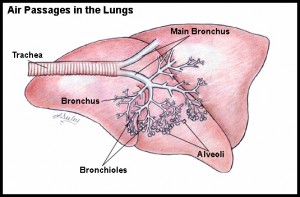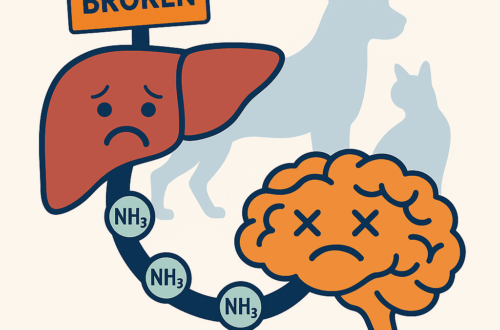I was sitting in the United Club in the C Terminal of Chicago’s O’Hare International Airport contemplating what to write for this blog post. I always want to provide useful information for pet parents, and my brain has been somewhat discombobulated with holiday happenings. Whilst brainstorming potential blog topics, I couldn’t help but note the frequency of coughing among my fellow travelers, and their cumulative hacking gave me the idea to write about one of the most common causes of chronic coughing in dogs: chronic bronchitis.
What is chronic bronchitis?
When animal takes a breath, air travels through the nose or mouth through the larynx (voice box) into the trachea (windpipe; main passage to the lungs). The trachea divides into left and right main bronchi, and each of these subsequently subdivides into progressively smaller airway passages called secondary and tertiary bronchi. As the airway passages continue to decrease in size, they become bronchioles that ultimately terminate into clusters of air sacs called alveoli where exchange of oxygen and carbon dioxide occurs.

The suffix “-itis” means inflammation. Thus bronchitis refers to inflammation of various bronchi (main, secondary, tertiary); if the bronchioles are inflamed, the term bronchiolitis is appropriate, and if the trachea is similarly affected, we use the term tracheitis. To be considered a chronic issue, a patient must cough for two or more consecutive months. Certainly there are many potential causes of chronic coughing in dogs (i.e.: congestive heart failure, cancer, pneumonia) and these ailments must be ruled out. Chronic bronchitis, sometimes called chronic obstructive pulmonary disease or COPD, is a slowly progressive and irreversible condition.
What are the clinical signs of chronic bronchitis?
The hallmark clinical sign of chronic bronchitis is coughing for at least two consecutive months. Other potential signs of this disease include:
- Worsened coughing with excitement and/or when waking up (very common)
- Exercise intolerance (common)
- Collapse episodes (rare)
How is chronic bronchitis diagnosed?
There is no definitive diagnostic test for chronic bronchitis; accordingly a diagnosis is made by:
- Ruling out other diseases that can cause chronic coughing
- Evaluating chest radiographs (x-rays) for compatible findings of chronic bronchitis
- Documenting inflammation in the respiratory tract
- Showing a negative bacterial (+/- fungal) culture from the respiratory tract
- Documenting a positive response to a corticosteroid
Common diseases that also readily cause chronic coughing in dogs are:
- Tracheal collapse
- Laryngeal diseases
- Lung diseases
- Heart diseases
- Heartworm disease
Consultation with a board-certified veterinary internal medicine specialist can be invaluable when conducting a thorough diagnostic investigation for a dog with suspected chronic bronchitis. Specialized minimally invasive tests are needed to achieve a diagnosis of chronic bronchitis, particularly laryngotracheobronchoscopy. Using a unique fiber-optic camera, a veterinary is able to look inside the respiratory tract to observe dynamic changes in the airways, identify lesions, remove any foreign objects, and collect samples for culture (called bronchoalveolar lavage or tracheal washing.” Click here to watch a video of a brochoalveolar lavage.
How is chronic bronchitis treated?
There are several therapies used to treat chronic bronchitis. One should understand this disease cannot be cured, and is most effectively treated using more than one medication (aka: multimodal therapy). Another important point to accept is therapy is unlikely to completely resolve a dog’s cough.
A dog with chronic bronchitis will likely always cough to some degree.
The primary goals of therapy for chronic bronchitis are:
- To reduce the frequency of coughing by at least 70-80%
- To reduce the severity of coughing episodes
Administering corticosteroids (i.e.: prednisone, fluticasone) is the primary treatment for this disease, as this class of medication reduces the profound inflammation present in the airway.



Corticosteroids are initially administered by mouth (orally), but long-term administration is ideally via inhaler. Long-acting corticosteroids (i.e.: DepoMedrol) are not recommended for chronic management unless all other options have failed.
Other drugs that may be prescribed for a dog living with chronic bronchitis are:
- Cough suppressants (i.e.: diphenoxylate atropine/Lomotil, hydrocodone, butorphanol)
- Medications that dilate the airways called bronchodilators (i.e.: albuterol, theophylline, terbutaline)
- Alternative anti-inflammatories (i.e.: montelukast/Singulair, maropitant/Cerenia, tumeric, docosahexaenoic acid)
Consulting with a board-certified veterinary internal medicine specialist to develop an effective treatment plan for a dog with chronic bronchitis can be very helpful. Yet medications are not the only therapies used to combat chronic bronchitis. Equally important are identifying and removing any possible underlying triggers of coughing, particularly:
- Secondhand smoke
- Pungent cleaners
- Strong perfumes / colognes
- Scented cat litter
- Dirty furnace filters
The take-away message about chronic bronchitis…
Chronic bronchitis is a relatively common cause of chronic coughing in dogs. Definitive diagnosis requires elimination from possibility other diseases that cause chronic coughing, documenting inflammation in the airway, and verifying a positive response to prescribed therapies. The expertise and experience of a board-certified veterinary internal medicine specialist can be invaluable for developing an effective treatment plan for a dog living with chronic bronchitis.
To find a board-certified veterinary internal medicine specialist, please visit the American College of Veterinary Internal Medicine.
To find a board-certified veterinary emergency and critical care specialists, please visit the American College of Emergency and Critical Care.
Wishing you wet-nosed kisses,
cgb




